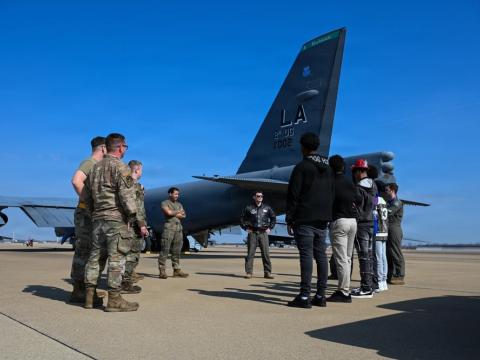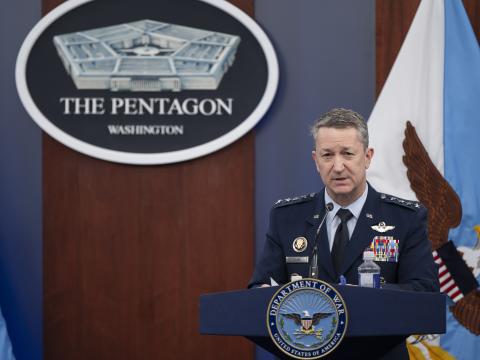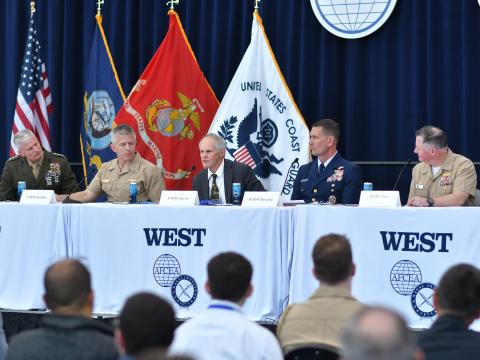Mentorship and Sponsorship Are Critical for Supporting Women in the Workforce
When it comes to promoting opportunities for women in cyber, defense, intelligence and homeland security, the key to success lies in engaging with mentors and making lasting connections. Vice Adm. Kelly Aeschbach, USN, commander, Naval Information Forces, shared her reflections on the challenges and opportunities facing women in the workforce during the Women in AFCEA Appreciation Event at WEST in San Diego.
When it comes to Navy information warfare and the Navy at large, Adm. Aeschbach recognized two things: “One is that we need more women in STEM and serving as STEM professionals in every facet of industry academia and government … and secondly, none of this advancement happens without mentorship or sponsorship.”
The admiral’s own path to Navy leadership began at age 12, when her parents shared that she would need a scholarship to fund her dream of a four-year college. As the oldest of four children in a Navy family and the only daughter, she previously had no interest in serving in the military. “Candidly, I went ROTC for economic reasons, and I was really fortunate that I fell into something in terms of camaraderie, networking, mentorship, etc. that turned out to be one of the best things that clearly has ever happened to me. It was the beginning of a fabulous journey.”
Adm. Aeschbach joined the ROTC when the combat exclusion law still existed. “I ended up in intelligence more out of eliminating what I couldn’t do,” explained the admiral.
But joining the intelligence field became a tremendous opportunity. “I was really excited to be out in a field where you really were recognized for the merit of what you did in your job. And I was very lucky at a very early point in my career that I felt like I was included and acknowledged for the contribution I was making, regardless of gender at a time when women still weren’t integrated across the force.”
Despite finding a path that suited her, Adm. Aeschbach often faced self doubt in her career. As the first intelligence officer asked to run the Navy’s largest communication station, she worried about her credibility with the team. Rather than let that doubt hinder her, the admiral harnessed it for success. “You really need to be honest about what you don’t know,” she explained. Bring your humility, ask questions and empower those around you.
“If any of that anxiety ever stems from the fact that you think somebody picked you for the job just because you’re a woman—who cares? Show them that you are the best person for the job,” said Adm. Aeschbach. “If they picked you to be on the team, show them that they didn’t make a mistake and that they should have more women on the team.”
Anxiety and self doubt can even be beneficial, said Adm. Aeschbach. “There’s goodness in anxiety. I always tell people, you’re missing the mark if you actually aren’t sweating it a little bit when you get up to talk or you have to do anything. It makes you better. It makes you check yourself. It makes you think hard about bringing your best.”

I always tell people, you’re missing the mark if you actually aren’t sweating it a little bit when you get up to talk or you have to do anything. It makes you better.
The admiral also reflected on the Navy’s progress with women in the service. “Over the last 33 years, there have been some really remarkable changes. We have women aviators flying strike missions from carriers. We have women who have been carrier strike group commanders. We have women in submarines now.” Progress has been made with new programs to retain women, provide family support and navigate a career while balancing personal aspirations.
As the service continues to embrace diversity, the admiral noted that clear minimum requirements must be maintained in all positions. “I am a proponent that I think we should have one standard. But anyone who can meet that standard, I think should be allowed to serve and perform in that role.”
Adm. Aeschbach shared her playbook for success, which featured four “ships” in true Navy spirit. Mentorship, sponsorship, friendship and partnership. We all need to look for opportunities to mentor those around us, explained the admiral. And then we need to move beyond mentorship to really produce outcomes and connect people with key positions.




Comments